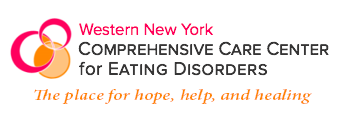Prevention
Body dissatisfaction, especially weight concern,
is the strongest predictor of disordered eating and eating disorders. Body dissatisfaction can also contribute to
Body dissatisfaction, especially weight concern, is the strongest predictor of disordered eating and eating disorders. Body dissatisfaction can also contribute to weight gain when extreme weight control practices lead to binge eating. Through media and advertising, we are continually exposed to an unhealthy ideal and many feel the pressure to conform to this ideal.
Families, schools, and health care professionals are in an excellent position to bring about positive changes in society today. They can help promote positive body image, eliminate weight bias and stigma, and foster a balanced, healthy approach to eating and activity.
Community awareness regarding eating disorder prevention, treatment, and research, is hugely important to support people who are struggling with this disease.
You can participate in eating disorder prevention efforts by:
- Connecting for change
- Raising awareness
- Acquiring skills for healthy living, self-esteem, and positive body image
- Working to change community systems, norms and practices
- We offer a number of educational resources and presentations for providers, schools, and colleges to spread knowledge on how best to help individuals at risk for body image problems and eating disorders.
For more information, please contact our Care Manager at:
Email: WNYCCCEDCareManagement@urmc.rochester.edu
Call: (585) 276-6102
NEDA: Risk Factors for Eating Disorders
https://www.nationaleatingdisorders.org/learn/general-information/risk-factors
Signs & Symptoms of an Eating Disorder
https://www.urmc.rochester.edu/childrens-hospital/adolescent/eating-disorders/look-for.aspx
Media, Body Image, and Eating Disorders
https://www.nationaleatingdisorders.org/media-body-image-and-eating-disorders
The National Eating Disorders Association provides valuable web based toolkits for educators, parents, and coach and trainers that offer a wealth of information about eating disorders, treatment options and insurance options.
-
- NEDA Educator Toolkit: For educators, staff who work in a school setting or those who work with youth outside of school: https://www.nationaleatingdisorders.org/educator-toolkit
- NEDA Parent Toolkit: For anyone who wants to understand more about how to support a family member or friend affected by an eating disorder: https://www.nationaleatingdisorders.org/parent-toolkit
- NEDA Coach & Trainer Toolkit: For staff who work in gyms, school settings, outside athletic groups, dance studios, etc. who would like to know how to support athletes who may be affected by eating disorders: https://www.nationaleatingdisorders.org/coach-trainer
For more information, please contact our Care Manager at:
Email: WNYCCCEDCareManagement@urmc.rochester.edu
Call: (585) 276-6102
Prevention is any systematic attempt to change the circumstances that promote, initiate, sustain, or intensify problems like eating disorders. Eating disorders arise from a variety of physical, emotional, and social issues, all of which must be addressed for effective prevention and treatment.
Records of eating disorders exist throughout history and in cultures around the world. Since the 1950s, however, reports of all eating disorders have increased dramatically, especially in Western cultures. At the same time, people in these same cultures have increased dieting for weight loss and the amount of attention they pay to the food they eat and their body size and shape. This suggests that these factors may play a role in the development of eating disorders. Scientists believe that if they can reduce the risk factors for eating disorders, then they can reduce the chances that a person will go on to develop an eating disorder.
Prevention efforts may involve reducing negative risk factors, like body dissatisfaction, depression, or basing self-esteem on appearance, or increasing protective factors, like a non-appearance-oriented self-definition and replacing dieting and body snarking with intuitive eating and appreciation for the body’s functionality.
Although it’s too soon to say that any specific prevention program can reduce the rates of diagnosable eating disorders, these programs do show benefits in reducing risk factors for eating disorders, such as fasting, purging, and other unhealthy weight loss behaviors, as well as in decreasing disordered eating.
For more information, please contact our Care Manager at:
Email: WNYCCCEDCareManagement@urmc.rochester.edu
Call: (585) 276-6102
The Body Project is a group-based intervention that provides a forum for high school girls and college aged women to confront unrealistic appearance ideals and develop healthy body image and self-esteem. It has repeatedly been shown to effectively reduce body dissatisfaction, negative mood, unhealthy dieting and disordered eating.
There are several trained Body Project group leaders in the Rochester area and elsewhere in western NY. For more information about attending a group session or inviting someone to lead a group within your organization, please contact our Care Manager at:
Email: WNYCCCEDCareManagement@urmc.rochester.edu
Call: (585) 276-6102
Prevention and early identification are critical to timely and effective treatment for disordered eating and body image concerns that can lead to eating disorders.
The WNYCCCED provides two educational series to help community providers and school-based professionals learn the skills to prevent, identify and treat eating disorders. Click on the links below for more information about these series.
Project ECHO® Eating Disorders
School-based Project ECHO® Eating Disorders
Our Health Project Coordinator, Jim Witmer can answer any further questions you may have.
Find more information about Western NY Comprehensive Care Center for Eating Disorders (WNYCCCED) here.
Lear how you can get involved here.
